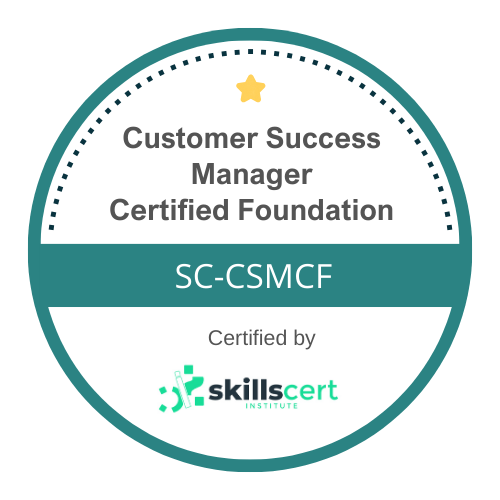Customer Success Manager Certified Foundation
Customer Success Manager Certified Foundation
Customer Success Manager certification validate a range of knowledge and skills related to effectively managing customer relationships and ensuring their success.
Customer Relationship Management: Understanding how to build strong relationships with customers, assess their needs, and create tailored strategies to ensure their success with your product or service.
Product/Service Knowledge: In-depth knowledge of the product or service being offered, including its features, benefits, and use cases. This enables the Customer Success Manager to provide accurate guidance to customers.
Communication Skills: Effective communication is essential. Customer Success Managers should be able to communicate clearly, both verbally and in writing, to provide instructions, updates, and solutions to customers.
Problem Solving: Developing the ability to identify issues or challenges customers face and providing effective solutions or workarounds to ensure customer satisfaction.
Data Analysis: Utilizing customer data and analytics to track customer usage, behavior, and satisfaction. This information helps in identifying areas for improvement and proactive engagement.
Customer Onboarding: Knowledge of best practices for successfully onboarding new customers, ensuring they quickly understand how to use the product or service to achieve their goals.
Renewal and Upsell Strategies: Learning strategies to proactively engage with customers to drive renewals and identify upselling opportunities based on their evolving needs.
Churn Management: Understanding the reasons behind customer churn (cancellation) and implementing strategies to prevent it through personalized support and solutions.
Time Management: Prioritizing tasks, managing multiple customer accounts, and efficiently allocating time to provide quality service to each customer.
Cross-functional Collaboration: Working closely with sales, marketing, product development, and other teams to ensure a seamless customer experience and alignment across the organization.
Customer Feedback and Advocacy: Gathering feedback from customers to provide insights for product improvement and acting as a customer advocate within the company.
Continuous Learning: Staying up-to-date with industry trends, best practices, and new technologies that could impact customer success strategies.
Conflict Resolution: Developing skills to handle difficult customer situations and conflicts in a professional and satisfactory manner.
Metrics and Key Performance Indicators (KPIs): Understanding the metrics that gauge customer success, such as Net Promoter Score (NPS), Customer Satisfaction (CSAT), and Customer Lifetime Value (CLTV).


